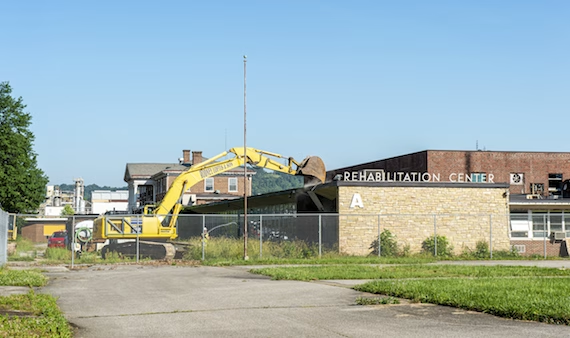Contact: Jack Bailey (304) 766-4109 jbaile19@wvstateu.edu INSTITUTE, W.Va. – West Virginia State University (WVSU) continues efforts to strengthen its agricultural, food, and natural resources programming through infrastructure improvement activities at the site of the former West Virginia Rehabilitation Center in Institute. The property, which was transferred to WVSU in 2014, will become home to the University’s Agricultural and Environmental Research Station and Extension Service, as well as other agricultural education initiatives.
Crews began demolition of a portion of dilapidated buildings this week to make way for a new permanent greenhouse complex, while other buildings will be renovated into research, educational and office spaces.
“We are working arduously to implement these projects and are extremely excited about this campus transformation for the benefit of the entire University,” said Associate Vice President for Research and Dean of Land-Grant Programs Dr. José Ulises Toledo. “We encourage the campus and surrounding communities to continue following this transformation, and especially invite future Yellow Jackets to explore these new resources and opportunities.”
Such opportunities include the University’s recently announced degree options in agriculture, which administrators hope to expand under the leadership of Interim President Dr. R. Charles Byers. Through a $750,000 USDA-funded 1890 Scholarship Program, students can enroll in newly formed programs focusing on plant-soil science, agribusiness, and agricultural economics.
While many buildings that were part of the rehab center are beyond repair, administrators are working to renovate and restore those buildings that are still inhabitable. In 2018, the former F. Ray Power Building of the rehab center was renovated into the WVSU Integrated Research and Extension Building, which now holds a series of state-of-the-art agricultural research laboratories, classroom and meeting spaces, and offices.
Additional renovations to buildings, including what was the former site of a school for blind and deaf African-American youths, are forthcoming. University administrators are working with the West Virginia Department of Arts, Culture and History’s State Historic Preservation Office to ensure the integrity of the historic former school is maintained.
Funding for the renovations comes from the USDA’s 1890 Facilities Grant Program, the goal of which is to improve food, agriculture, and natural resources programing efforts at 1890 land-grant universities. WVSU is one of 19 such institutions in the nation.
Follow on Facebook, Instagram and Twitter .

West Virginia State University Expands Agricultural Research, Outreach and Education Efforts at Former Rehab Center Site
June 12, 2020